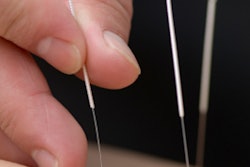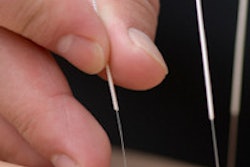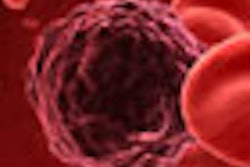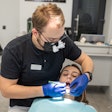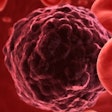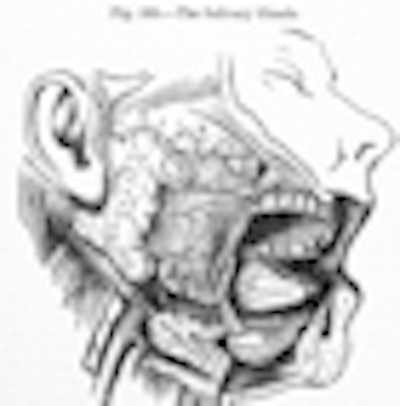
Acupuncture can relieve the symptoms of xerostomia in patients who undergo radiotherapy for head and neck cancer, according to a new study in Annals of Oncology (October 24, 2012).
Doctors at seven cancer centers in the U.K. recruited 145 patients suffering from radiation-induced xerostomia to a trial comparing acupuncture with education about oral care. The patients were randomized to receive group acupuncture sessions for 20 minutes every week for eight weeks, or two oral care educational sessions for one hour, one month apart. Four weeks after the end of these two different types of care, the patients swapped over to receive the other treatment.
Symptoms of xerostomia were measured objectively using Schirmer strips, which measure the amount of saliva in the mouth. A tried and tested quality-of-life questionnaire measured patients' subjective reporting of how their mouths felt, with questions about changes in individual symptoms, such as sticky saliva, dry lips, needing to sip water to relieve a dry mouth, needing to sip water to help swallow food, and waking at night to sip water.
Centre
Although the researchers found no significant changes in saliva production, patients who had received nine weeks of acupuncture were twice as likely to report improved dry mouth than patients receiving oral care. Individual symptoms were also significantly improved among the group receiving acupuncture.
"Time had an important effect on key symptoms, with patients receiving acupuncture showing a quick response, which was sustained over several weeks," stated study author Dr. Richard Simcock, a consultant clinical oncologist at the Sussex Cancer Centre, in a press release.
The subjective reporting of improvements in xerostomia was of more significance than the lack of changes in the objective test with the Schirmer strips, he and his co-authors noted.
"There was no clear relationship between a patient indicating they had a very dry mouth and the measurement of saliva on the Schirmer strips," Dr. Simcock explained. "By definition, these patients with chronic xerostomia produced little or no saliva, making objective measurements really difficult."
Many studies have focused on the objective measurement of how much saliva is produced, but the amount of saliva produced does not necessarily influence the experience of a dry mouth, he added.
"Xerostomia is therefore an entirely subjective symptom -- it is what the patient says it is, regardless of salivary measurement," Dr. Simcock said.
The researchers also believed that the improvements in the experience of xerostomia were unlikely to be due to a placebo effect.
"The profound impact that xerostomia exerts on functions such as eating, talking, and sleeping, which were relieved by the acupuncture means that if it is entirely a placebo effect, then this is a pretty powerful placebo," said Valerie Jenkins, deputy director of Sussex Health Outcomes Research & Education in Cancer at Brighton & Sussex Medical School and who supervised the research. "In addition, the results showed that patients were less likely to wake at night to sip water after treatment -- this effect seems difficult to ascribe solely to placebo."
The skepticism that exists about complementary therapies such as these is often due to inadequately designed and reported studies, she added. "This was a well-controlled, randomized trial conducted in major cancer centers throughout the U.K. with good governance and reporting of adverse events."
Further studies are needed to refine the acupuncture technique and discover how long its effect lasts and whether booster sessions might be required, she and her colleagues noted. But they believe it could be easily incorporated into the care of patients with xerostomia.




